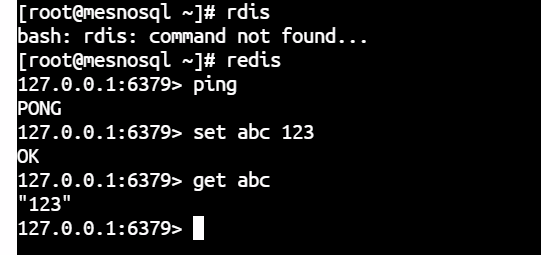System: CentOS Linux release 7.9.2009 (Core)
1. Installation of GCC
Since redis is developed in C language, you must first confirm whether to install gcc environment (gcc -v) before installation. If not, execute the following command to install
course: https://www.cnblogs.com/huangshuqiang/p/15477407.html
2. Download and unzip the installation package
[root@mesnosql ~]# wget http://download.redis.io/releases/redis-6.2.6.tar.gz [root@mesnosql ~]# tar -zxvf redis-6.2.6.tar.gz
3. Switch CD to redis decompression directory and execute compilation
[root@mesnosql ~]# cd redis-6.2.6 [root@mesnosql redis-6.2.6]# make
4. Install and specify the installation directory
[root@mesnosql redis-6.2.6]# make install PREFIX=/usr/local/redis
5. Start service - background start
[root@mesnosql redis-6.2.6]# cd /usr/local/redis/bin/
Copy redis.conf from the redis source directory to the redis installation directory. PS: push to ~ directory.
[root@mesnosql ~]# cp redis-6.2.6/redis.conf /usr/local/redis/bin/
6. Modify the redis.conf configuration file. PS: re enter bin
[root@mesnosql bin]# vim redis.conf
There are three main modifications:
1). Add # comments before bind ; Unlimited ip access. By default, it can only be accessed locally
Add # comments before bind ; Unlimited ip access. By default, it can only be accessed locally
2).
The default is yes and changed to no. Turn off the protected mode mode, and the external network can access it directly
3). 
Daemon is used to specify whether redis should be started as a daemon thread. The default is no
7. Start redis
[root@mesnosql bin]# ./redis-server redis.conf
8. Set startup
root@mesnosql bin]# vi /etc/systemd/system/redis.service
Copy and paste the following:
[Unit] Description=redis-server After=network.target [Service] Type=forking ExecStart=/usr/local/redis/bin/redis-server /usr/local/redis/bin/redis.conf PrivateTmp=true [Install] WantedBy=multi-user.target
Note: ExecStart is configured as its own path
9. Set startup
[root@mesnosql bin]# systemctl daemon-reload [root@mesnosql bin]# systemctl start redis.service [root@mesnosql bin]# systemctl enable redis.service
10. Create redis command soft link
[root@mesnosql ~]# ln -s /usr/local/redis/bin/redis-cli /usr/bin/redis
Test redis

At this point, redis installation is complete.
Service operation command
systemctl start redis.service # Start redis service
systemctl stop redis.service # Stop redis service
systemctl restart redis.service # Restart the service
systemctl status redis.service # View the current status of the service
systemctl enable redis.service # Set startup and self startup
systemctl disable redis.service # Stop startup and self startup.
Supplement 1: redis make reports an error after upgrading GCC to the latest version. Solution:
Error when making: / bin/sh: cc: command not found
solve:
1. Go back to the root directory (~)
sudo yum -y install gcc gcc-c++ libstdc++-devel
2. When returning to the redis make directory, execute:
make MALLOC=libc
Supplement 2: when the firewall is turned on, the external network cannot be accessed
View open ports
firewall-cmd --list-ports
View firewall status
firewall-cmd --state
Turn on the firewall
systemctl start firewalld
Open port
firewall-cmd --zone=public --add-port=6379/tcp --permanent
service iptables restart
firewall-cmd --reload
After opening the port, you must restart the firewall, otherwise opening the port will not work.
Conclusion: I have never been in contact with linux before. When installing redis, I encountered many problems. It took several days to install it successfully. Most of the installation tutorials on the Internet are not good.
Finally, at each installation step, although there are sometimes a large series of commands, you must pay attention to whether there is an error in it, otherwise in the end, redis will be confused if it can't be used.
reference resources:
https://www.cnblogs.com/heqiuyong/p/10463334.html
https://redis.io/download Official course
https://www.cnblogs.com/Crazy-Liu/p/14313017.html
https://blog.csdn.net/liyanhui1001/article/details/106589682
https://www.cnblogs.com/xuliangxing/p/7151685.html